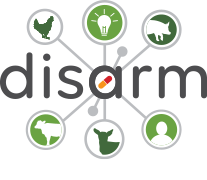Guidelines for antimicrobial resistance from the dairy sector
Dairy farmers can set up biosecurity measures to prevent introduction of diseases and bacteria onto the farm; implement an effective herd health management programme, as well as for chronically infected cows; set up cleaning and disinfection strategies to prevent spread of diseases. Farmers need to ensure that the use of antimicrobials is based on adequate diagnostic and only used as directed, as well as avoid their preventive use. Withdrawal times must be respected and supported with a strategic residue testing of milk. Milking routines should not injure the animals or introduce contaminants into milk. Farmers should avoid feeding milk-containing residues to calves or other animals on the farm. Animal feed and water must be of suitable quantity and quality.
Veterinary professionals ensure reliable diagnosis, prevention of diseases and consider alternatives to antimicrobial treatment. They should avoid treatment of incurable animals as well as self-curing diseases with antimicrobials, give clear advice on the appropriate use of an antimicrobial product, including the dose, rates and length of treatment, withholding periods, and recording. Veterinarians should declare and register to your national authorities all drugs prescribed on farm.
The use of antimicrobials is only part of an animal health management programme that aims to limit disease in animals and improve animal welfare. Early detection of disease allows early intervention, and this minimises the need to use antimicrobials. Improved infection prevention and control measures limit disease spread and progressively reduce the usage of antimicrobial agents.
